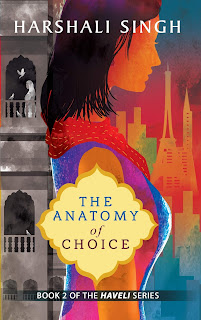THE ANATOMY OF CHOICE – HARSHALI SINGH
‘The Anatomy of Choice’ is the second book in the
Haveli series, narrating the tale of two women, Bhavya, the second daughter of
the Sharma family, and Noorie, a courtesan who lived in the days of yore, and
who now “rests close by, celebrated in death as she never was in life” singing
“hauntingly sad ghazals.”
The ivory-hued Haveli with the hundred doors and the
black domed mausoleum by its side are now known as Chaand and Chaand Raat, as
the love story of Noorie and Hamad Bahadur are played out by a modern pair of
lovers. There is a hint of romance that plays its way like a will-o-the wisp,
intriguing the reader, tantalizing and mysterious, as Noorie endeavours to
“remind him of our love through the music he loved so much”.
Transgressions are rarely forgiven, and Bhavya and
Tenzin realize how far they have drifted as a consequence of their choices.
Bhavya comes home to the Haveli, where she is welcomed back by her family.
However, there is a feeling of disquiet, as they wait for her to make up her
mind and get her life back on an even keel. Bhavya, on her part, values her
independence too much to allow anyone to hurry her into making her choices.
Harshali Singh weaves magic with her words, as she
tells a story that meshes together a family of characters, all of whom have
secrets deep within their hearts, be it Arun, the taciturn head, Uma, the
gentle matriarch with a spine of steel, Suresh, the faithful friend or the
tempestuous Bhavya. These secrets waft about as the reader senses their
presence throughout the book.
Uma comes across as the voice of reason, like when she
tells her headstrong daughter, “Decisions are the hardest to make, Bee,
especially when you have to choose between where you should be and where you
want to be.” This is the dilemma that Bhavya finds herself in as she flounders
between the hard decisions that she knows she needs to make, about staying in
the past or leaving it behind.
Bhavya’s whimsicality keeps her unpredictable. The
relationship between Bhavya and her siblings is often turbulent at many levels.
While Aruna and she glide over memories that are hurtful, her brother, Dheeraj
and she exchange angry words on many occasions. Etti, her younger sister is “a
minefield of hints and expectations, soundless”, waiting for Bhavya to own up
to her life choices.
The discovery of Noorie’s diary, “beaten
leather-covered ivory sheets of heavy handmade pages filled with... Devanagari
alphabets” imbues Bhavya with a curiosity about the erstwhile courtesan. She
“finds solace within the fragile pages of the journal written with henna-dyed
hands, centuries before her” as she spends time at the mausoleum, where she
senses that both Noorie and she are prisoners of their own circumstances.
Apart from the cover that symbolizes the choices of the
past and the present, Harshali Singh makes use of an unusual device to name her
chapters, using words from different languages along with their orgins, which
give the reader a hint of what nestles within the chapter. The language used
throughout the book is rich and filled with imagery, especially when the tale
harks back to the courtesan’s life.
A book that needs to be preserved as carefully as
Noorie’s diary!





Comments
Post a Comment